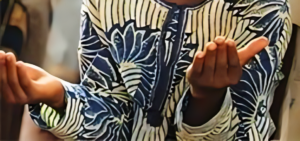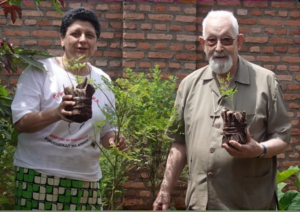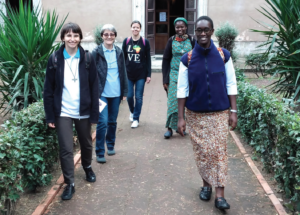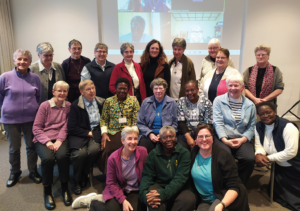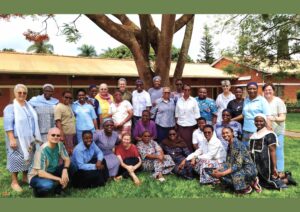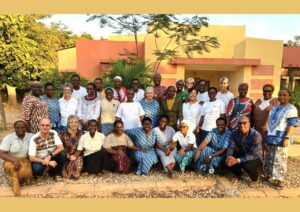One morning at the beginning of the rainy season, Emmanuel, in his fifties, called me through his eldest son. He had been a good catechumen for a long time but had abandoned everything except his Christian name. We knew each other well and I respected his decision taken long before I arrived.
That day, he let me know he was dying and wanted baptism before the great departure.
I knew he was very ill. Five kilometers separated me from his village, but what a road! The motorbike had to navigate through the mud. Emmanuel was at the end of his strength, and I found his great desire to ask Jesus his true shepherd to lead him to the Father. He himself had been a shepherd from a young age. At our second meeting, we celebrated his baptism with his wife and two sons who were already baptized.
A few days after, the younger son came to tell me that his father wanted to die in his native village. I thought in amazement at all the risks of returning to fetishes. So I wrote him a letter in which I expressed my sorrow for having baptized him, perhaps for nothing. The response was immediate. He, illiterate, replied by the hand of his eldest son. It was a re-reading of his whole life, in four pages:
Sister, do not be afraid, I will not return to my fetishes.
They made my life a hell. It is they who ordered me to force my wives obey me and to beat them. Previously, I had only one hand outstretched to God and he took it. But gradually he let go because he felt that I withdrew. Was it not in the amulets that I had put all my hope? Could they save me now that I am in distress? These amulets if they were gods, where are they now? Are they not the work of the sculptor and potter? I always refused baptism. But today if I accepted, this proves that I decided to change my life, believe me.
My departure for my native village was planned for next year but because of my illness, I have to go sooner so that if I die I will die in the village as I promised my mother. So do not worry that I might deny my baptism. Do you also not believe in the strength of baptism? And if you do not believe, why did you baptize me? Do you doubt the power of God the Father, Son and Spirit? All these sins I have committed since my youth, who can forgive me but God alone? Therefore through this baptism I give myself totally to God. This is not a hand or two hands I give but my whole self because I belong to him. If indeed, being in distress fetishes could not save me, it is because they have no authority and I have no intention of returning to them.
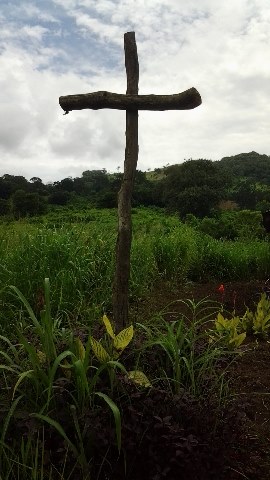 I do not expect God to do a healing miracle for me.
I do not expect God to do a healing miracle for me.
Never mind my life. If I am to live it is the will of God. If I die I die at peace with God. This is what matters to me now. But before that time comes, I forgive with all my heart my persecutor, all those who have offended me. I ask pardon of all whom I have offended. I put my life in God’s hands, whom I now recognize as my Father. At the hour of my death, my prayer will be this: “Father, forgive us our trespasses as we forgive those who trespass against us. Amen.”
“Thank you for my baptism!”
Shortly after, what was the surprise of my community to see Emmanuel coming all emaciated, on a muddy bike, articulating with difficulty these few words: “Thank you for my baptism!” He informed us that he was leaving for the village.
A few months passed. In the rainy season when everyone was working in the fields the eldest son came to tell us that his father had died and that his last wish was to be buried by the Christians. I left immediately and I arrived to find that the nearest village catechist was not available. So we four baptized persons would bury Emmanuel: his wife, his two sons and me.
What was my joy to see, hung above his bed, some Gospel pictures given during the preparation for baptism! A fervent prayer of four baptized persons close to his body and then his burial with the villagers.
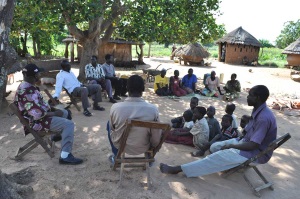
A month later, at the request of his older brother surrounded by the council of elders, a Eucharistic celebration gathered under a large straw shelter over 300 people with delegates from various Christian communities. When the catechist had finished explaining the Gospel of the Beatitudes, an official of the Muslim community, took the arm of the catechist, raised it up high several times as is the custom when they appreciate someone. The catechist had just explained the Gospel of the Beatitudes. It was the first proclamation for this village!
Later, Emmanuel’s elder brother told me: “The path of Christians, it is good, it is true, it does not lie!”
Sister Nicole Robion, Missionary Sister of Our Lady of Africa
To read more :
I am receiving my King. Gabrieli was one of the first catechists of the country (Zambia).


